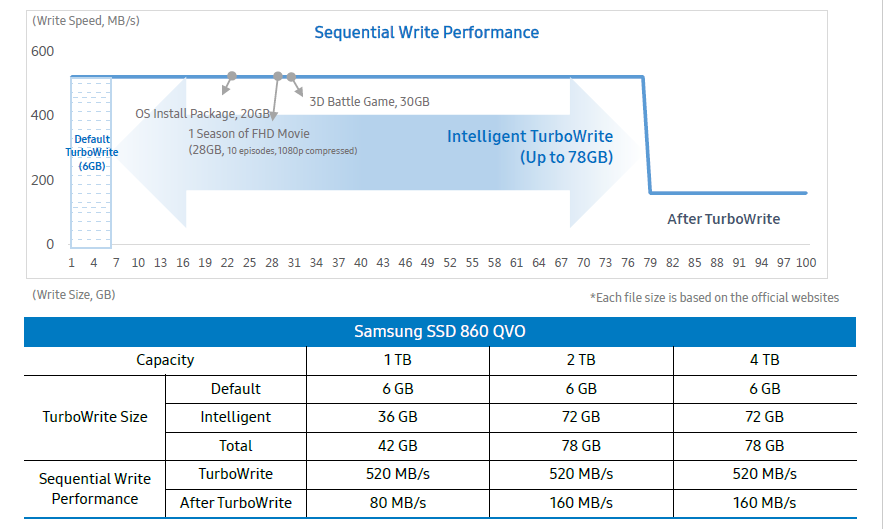Tom's Hardware Verdict
If you are in the market for a new SATA based SSD, the Samsung 860 QVO delivers acceptable performance, high capacity, and enough endurance to satisfy most users. It even includes AES 256-bit encryption with Windows BitLocker support. The only thing that's missing is the lower price point we expect from QLC SSDs, which makes the 860 QVO hard to recommend over the proliferation of faster and cheaper SSDs on the market.
Pros
- +
Decent endurance for a QLC SSD
- +
Build quality
- +
AES 256-bit encryption with Windows BitLocker support
Cons
- -
High introductory MSRP
- -
Write performance after SLC cache exhausts
- -
Three-year warranty
Why you can trust Tom's Hardware
Samsung 860 QVO
Samsung leads the SSD industry, largely due to the huge lead the company opened up in the race to 3D flash. Along the way, Samsung established a reputation as an SSD powerhouse and has consistently set the standard for performance, quality, and support. But it isn't the first to bring a QLC SSD to market. Companies like Intel and Micron/Crucial already have QLC SSDs, but we knew it was only a matter of time until the SSD giant joined in.
The 860 QVO features Samsung’s newest V4 QLC V-NAND paired with the SATA interface and its well-established MJX controller. Together, these components deliver over 550/520MB/s of sequential read/write throughput and up to 97,000/89,000 random read/write IOPS. However, performance is only one part of the equation: the 860 QVO uses lower-quality QLC flash that is supposed to bring lower prices and higher capacity to the masses, but the company's pricing isn't as competitive with other options as we expected.
Update: Due to an error, we adjusted the ranking to 3.5 after publication.
2018 marked the introduction of QLC SSDs, but they will truly thrive in 2019. Enthusiasts aren't very enthusiastic, though. QLC flash has inherently lower native write speeds and lower endurance than the TLC or MLC flash found in most modern SSDs. But, like the move to other types of flash before it, QLC should pave the way for larger storage devices and lower prices, which is always good for us. The Intel 660p is a prime example. At launch, it set the new low bar for value NVMe storage. Crucial's P1 followed soon after.
We finally learned about the 860 QVO when Samsung announced it earlier this year, and we were finally given a name at Samsung’s Tech Day event last month. During the announcement, Samsung briefly listed the 860 QVO on a slide alongside a 980 QVO but didn't provide more detail about the mystery 980 model. As with SSDs based on other types of flash, we expect models with higher performance and endurance to come to market alongside cheaper and slower models, so it's logical to conclude the 980 QVO will be a higher-performance model. Samsung hasn't announced a launch date.
For now, we have the 860 QVO in our hands. Other NVMe QLC SSDs preceded it to the consumer market, but the QVO is the first SATA QLC model.
Samsung had to dig into its firmware and tweak it a bit more to maintain a high level of performance with the more-complex V4 64-layer QLC V-NAND. The Samsung 860 QVO includes Intelligent TurboWrite technology, just like the 860 and 970 EVO models. This feature assigns a portion of the flash to run in SLC mode, thus creating a fast cache that absorbs incoming data to speed operations.
Get Tom's Hardware's best news and in-depth reviews, straight to your inbox.
All QVO SSDs come with a static 6GB write cache that doesn't change regardless of conditions, but they also have a larger intelligent write cache of 36-72GB (depending on drive capacity). This intelligent cache dynamically expands and contracts based on the amount of data stored on the drive. This provides impressive performance for inbound writes, but if the drive doesn’t have enough free space the intelligent cache will not be available, leaving you with just 6GB of static cache. On the 1TB model, the intelligent cache evaporates after there is less than 168GB of free space. We have reached out to Samsung for specifics about the other capacities and will update as necessary.
Specifications
| Product | 860 QVO 1TB | 860 QVO 2TB | 860 QVO 4TB |
| Pricing | $149.99 | $299.99 | $599.99 |
| Capacity (User / Raw) | 1000GB / 1024GB | 2000GB / 2048GB | 4000GB / 4096GB |
| Form Factor | 2.5" 7mm | 2.5" 7mm | 2.5" 7mm |
| Interface / Protocol | SATA 6.0 Gb/s / AHCI | SATA 6.0 Gb/s / AHCI | SATA 6.0 Gb/s / AHCI |
| Controller | Samsung MJX | Samsung MJX | Samsung MJX |
| DRAM | 1GB LPDDR4 | 2GB LPDDR4 | 4GB LPDDR4 |
| NAND Flash | Samsung QLC V-NAND | Samsung QLC V-NAND | Samsung QLC V-NAND |
| Sequential Read | 550 MB/s | 550 MB/s | 550 MB/s |
| Sequential Write | 520 MB/s | 520 MB/s | 520 MB/s |
| Random Read | 96,000 | 97,000 | 97,000 |
| Random Write | 89,000 | 89,000 | 89,000 |
| Encryption | AES 256-bit, TCG/Opal V2.0, IEEE1667 | AES 256-bit, TCG/Opal V2.0, IEEE1667 | AES 256-bit, TCG/Opal V2.0, IEEE1667 |
| Endurance | 360 TBW | 720 TBW | 1,440 TBW |
| Part Number | MZ-76Q1T0 | MZ-76Q2T0 | MZ-76Q4T0 |
| Warranty | 3-Years | 3-Years | 3-Years |
The Samsung 860 QVO launches on December 16. The 1TB model will retail for $149.99, the 2TB model for $299.99, and the 4TB model for $599.99. All capacities are rated for up to 550/520 MB/s of sequential read/write throughput and up to 97,000/89,000 random read/write IOPS.
The QVO offers much higher endurance figures than the QLC-powered Intel 660p and Crucial P1. The QVO spans from 360TBW for the 1TB model up to 1,440TBW for the 4TB drive. What it doesn’t have, however, is a five-year warranty. Instead, Samsung covers the SSD for just three years. But that's expected considering the drive is in a lower tier than the 860 EVO and competes against the cheapest SSDs in the market, all of which also feature two- to three-year warranties.
Unlike most SSDs, Samsung’s 860 QVO features an AES 256-bit hardware encryption engine. It is TCG and Opal 2.0 compliant and also supports the IEEE1667 spec, meaning you can use it with Windows BitLocker, too. BitLocker is a big advantage if you want top-notch data security and don’t want to lose out on performance.
Software & Accessories
The 860 QVO works with Samsung's latest Magician SSD toolbox. Magician allows you to update the firmware, enable encryption options, monitor the health of your Samsung SSD, and more. Samsung also provides its Data Migration software, which allows you to clone over your data from an existing drive to your new SSD. You can download both from Samsung’s website.
A Closer Look
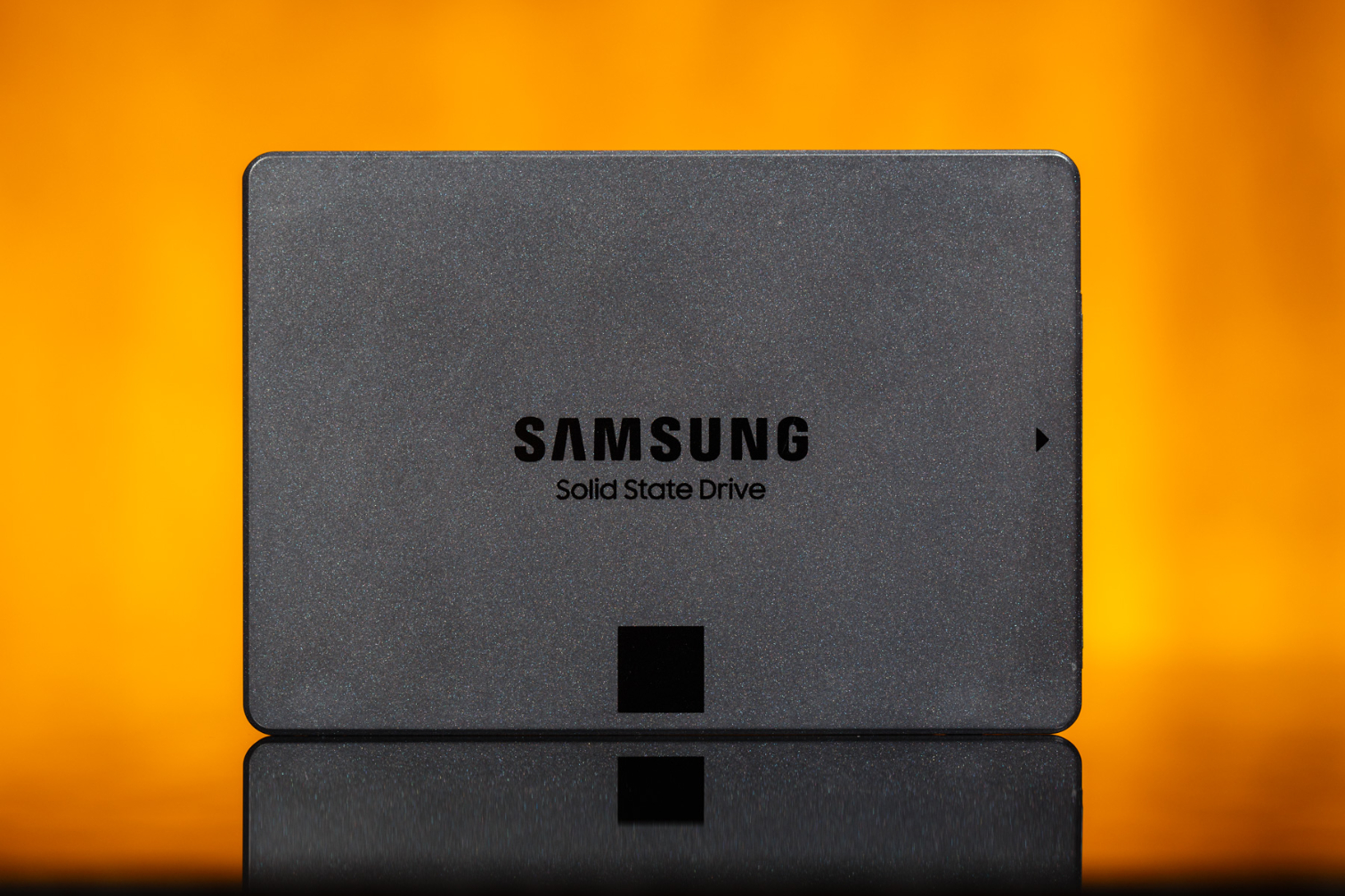
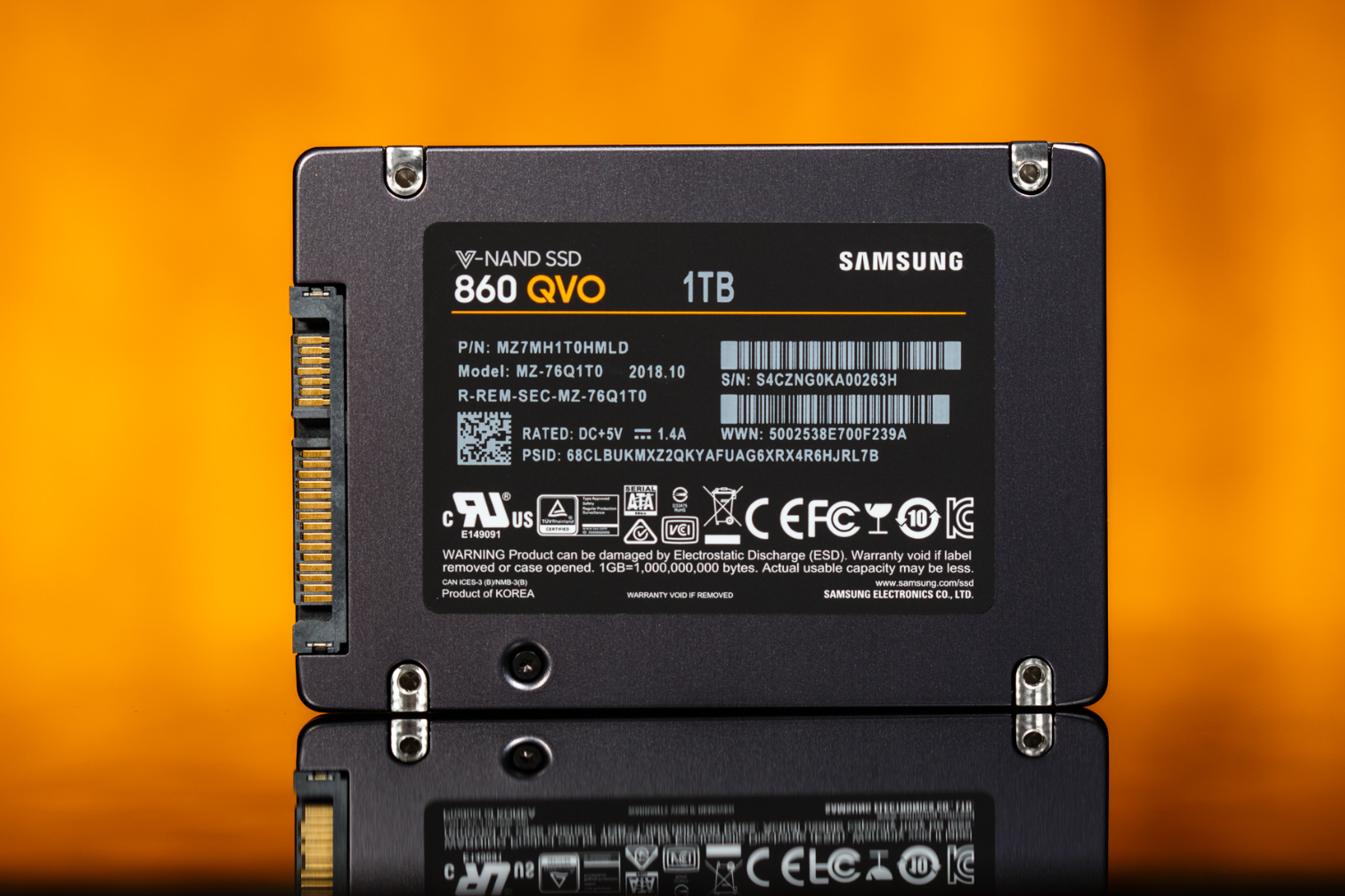
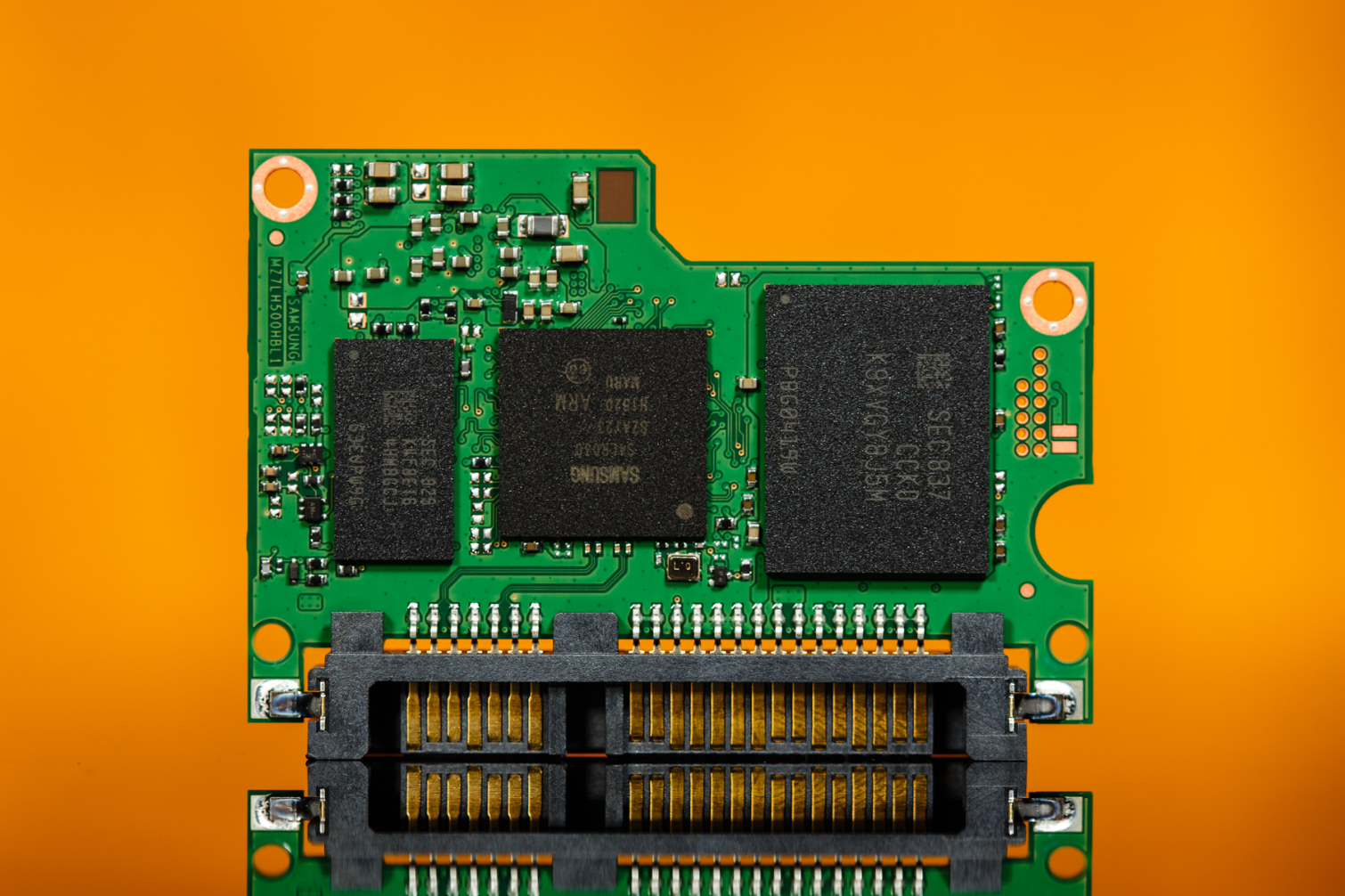
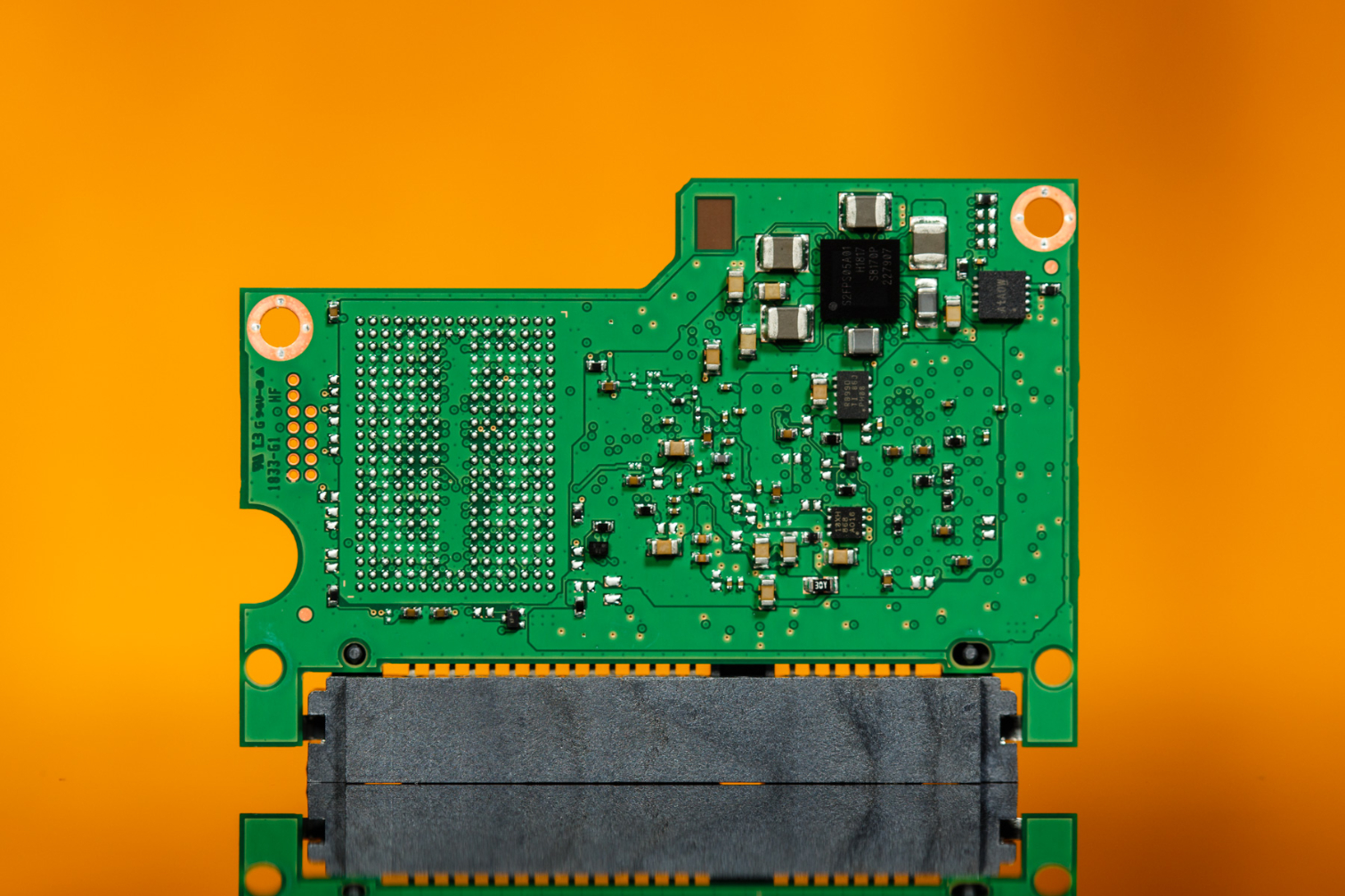
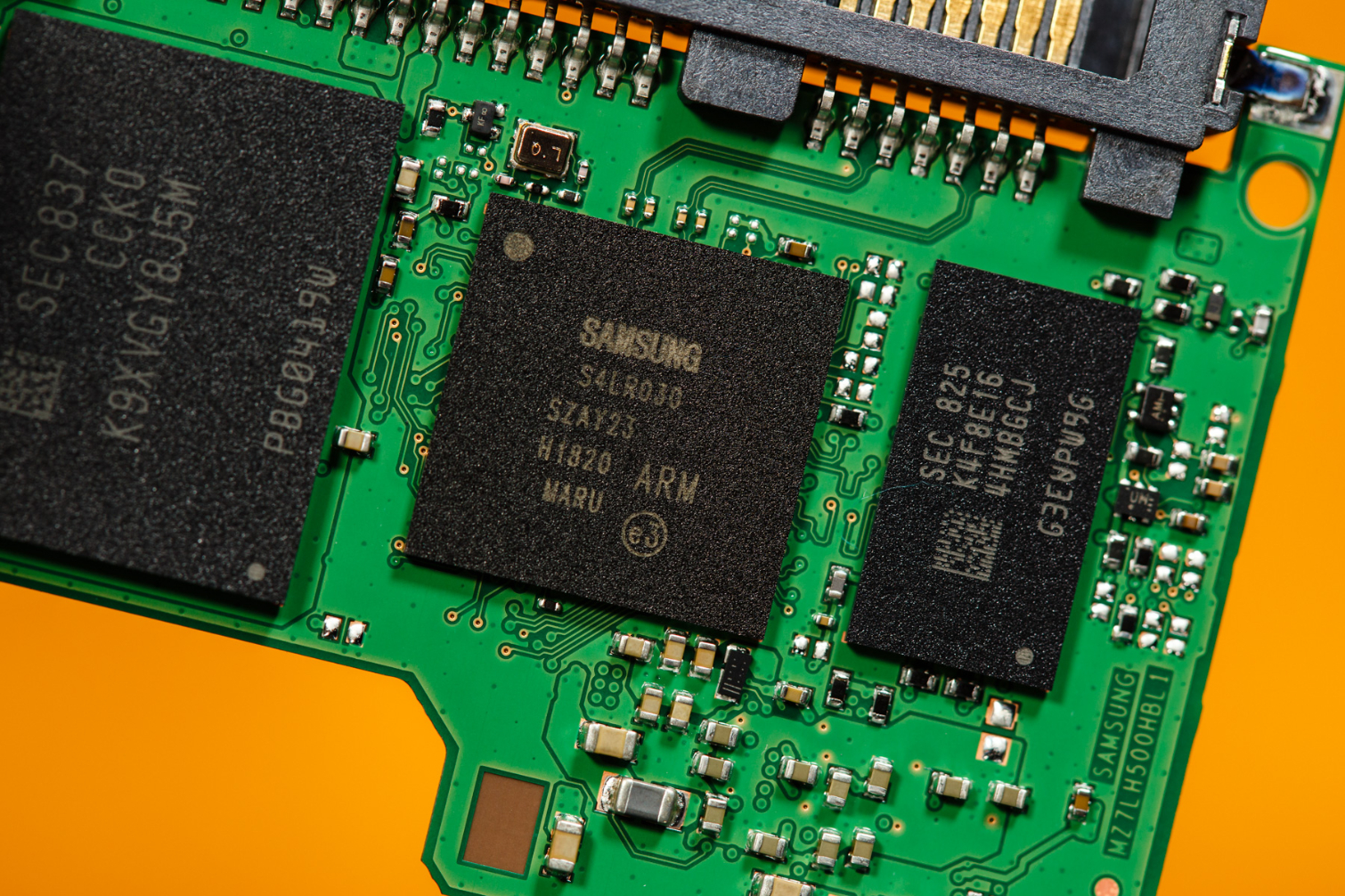
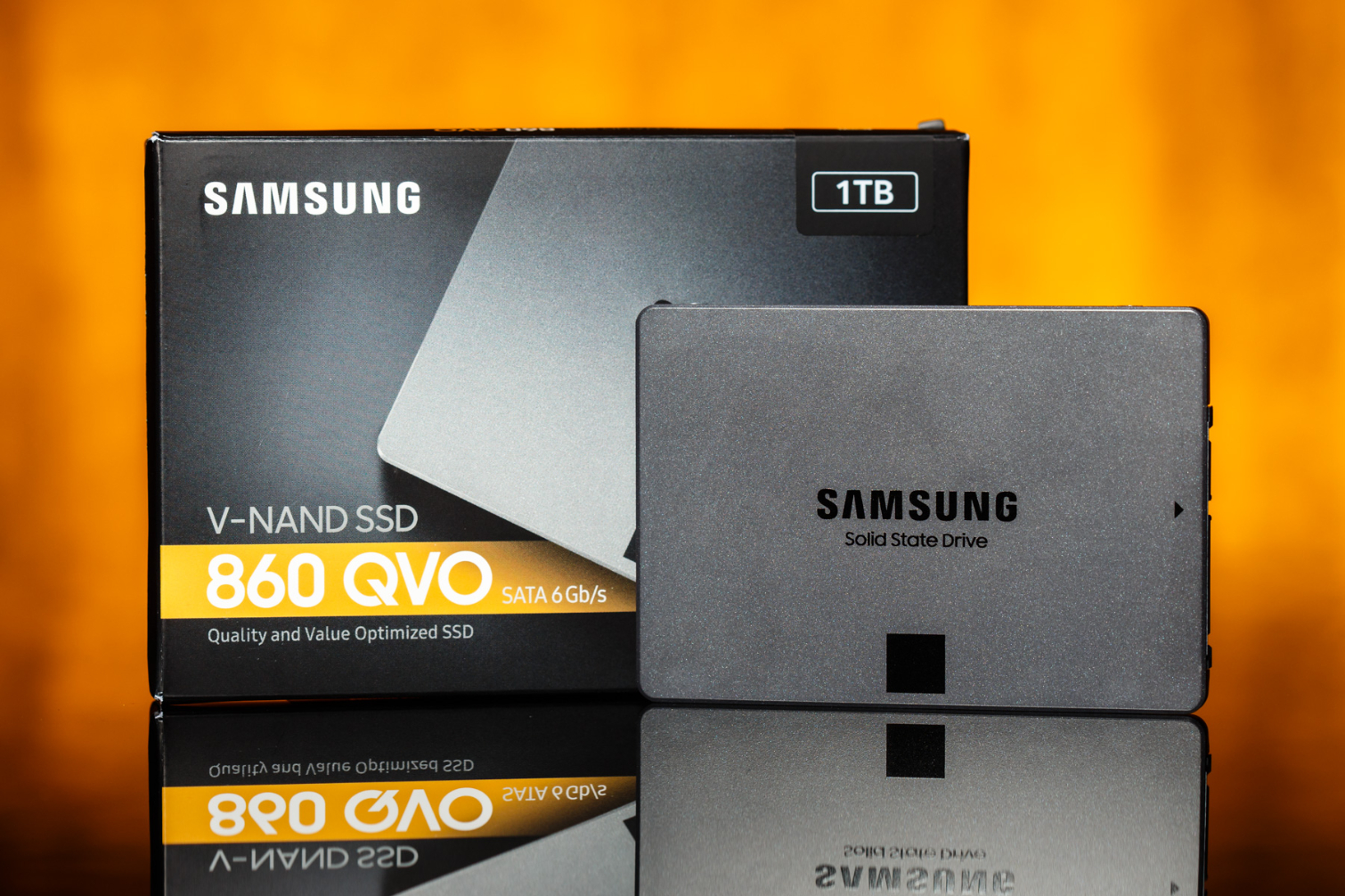
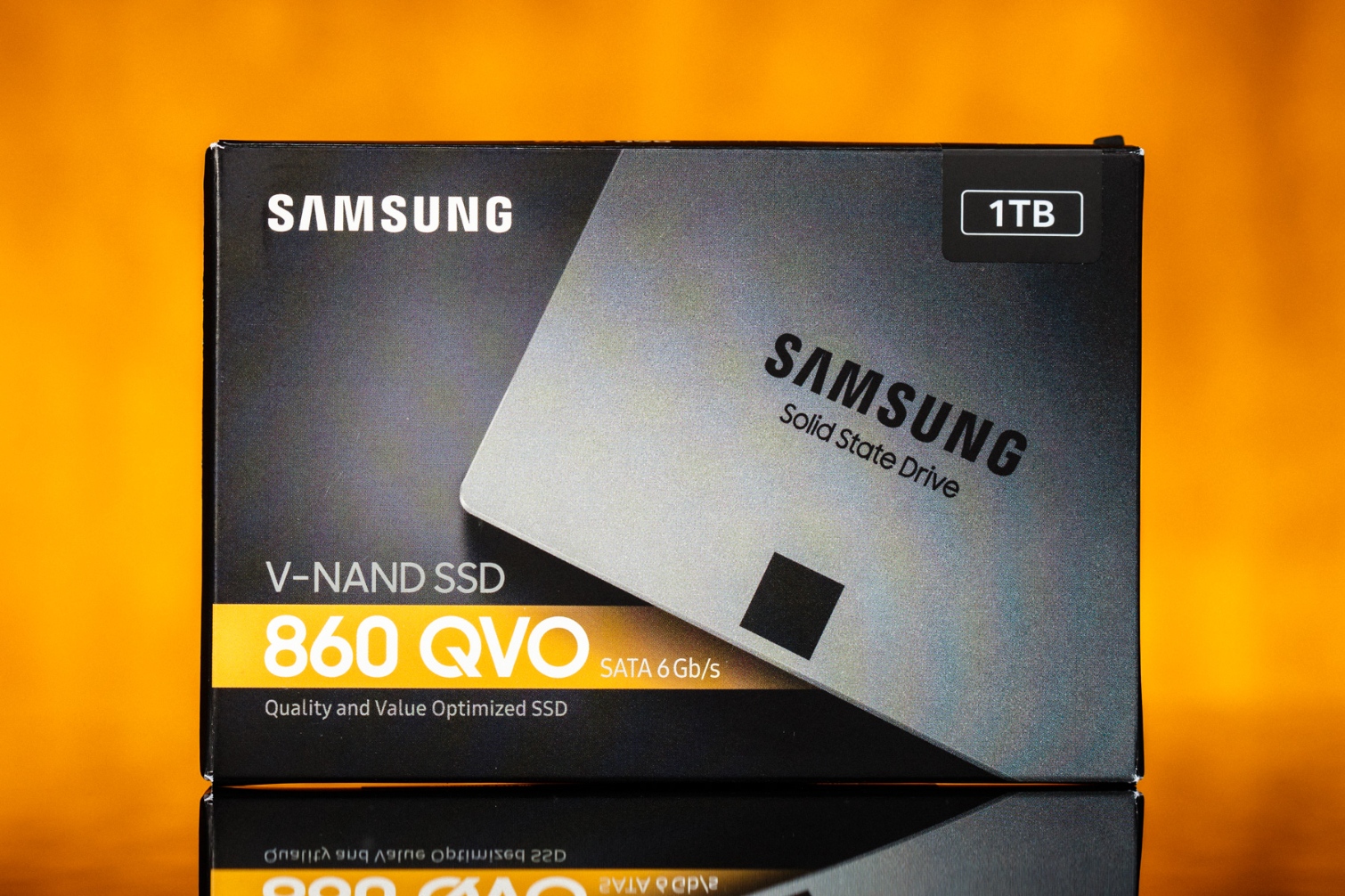
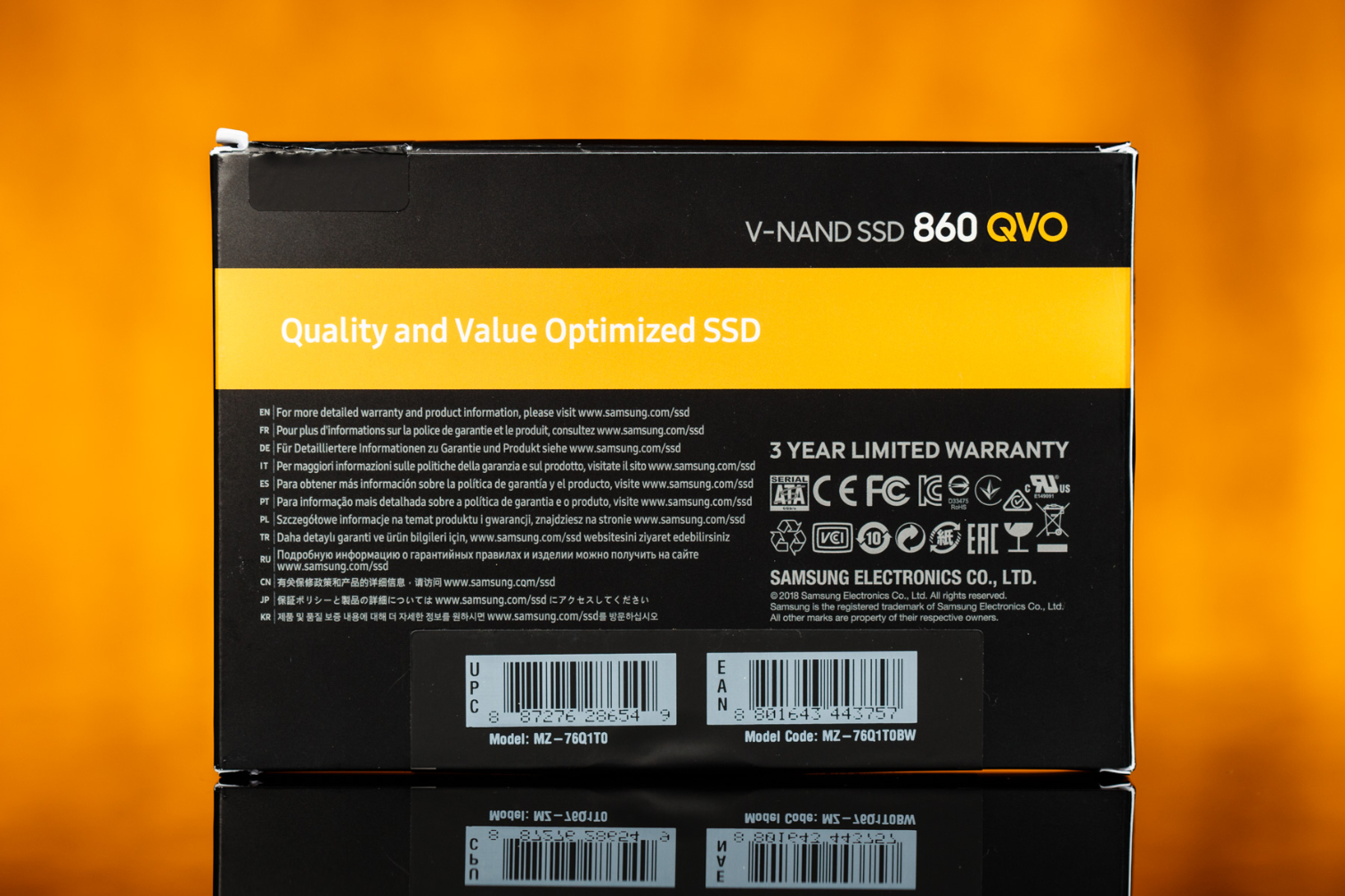
Samsung’s 860 QVO comes in a standard 2.5-inch 7mm form factor and connects to the host via a SATA 6GB/s connection. It has a sleek-looking full metal casing.
Inside the case, the 1TB model has one of the smallest PCBs we've seen, similar to the 860 EVO. The PCB hosts a single SSD controller, DRAM package, and NAND package. The 2.5” form factor seems like overkill given the size of the components, but the large case is needed to ensure compatibility with existing standards.
We see the same MJX controller as the one found in Samsung's EVO and PRO models, so compatibility and stability should not be an issue in most environments. The controller also supports LPDDR4 DRAM to improve power efficiency. Each QVO capacity point features a 1MB:1GB DRAM to flash ratio, meaning the 1TB model has a 1GB LPDDR4 DRAM package while the 4TB model has 4GB of LPDDR4. Memory products still command a premium during the ongoing shortage, so the DRAM allocation is an interesting choice considering most companies are using less DRAM to reduce costs. The Intel 660p, for example, only needs 256MB of DRAM for the 1TB model.
The flash has a die density of 1Tb, and there are a total of 8 dies stacked into a single package. The 1TB SSD provides 931.5GB of usable capacity after formatting. It is striking that Samsung can cram in 1TB of its V4 QLC flash into a single package and still deliver solid performance. Typically, SSDs need several flash packages working in concert, thus exploiting the benefits of parallelism, to reach similar levels of performance.
MORE: Best SSDs
MORE: How We Test HDDs And SSDs
MORE: All SSD Content

Sean is a Contributing Editor at Tom’s Hardware US, covering storage hardware.
